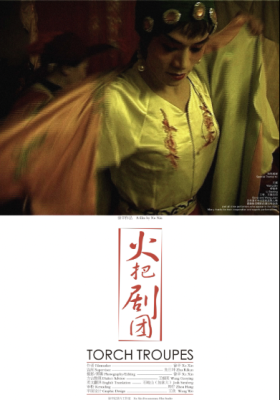Torch Troupe
"Torch Troupes" got their name from the Cultural Revolution period when traditional Sichuan Opera shows were prohibited in public and troupes were obliged to tour remote rural areas and to perform underground at night. Torches were used for lighting, thus the genesis of "torch troupes". In 2001, six national Sichuan Opera companies were integrated into one. Beside a few tours abroad, they have been almost out of activity and out of Chengdu residents' sight. Smaller local troupes were dismissed. Today, the informal show groups created by Sichuan Opera actors sent off by national companies in 1990s have become new "torch troupes" struggling for existence in rapidly changing times... There are three or four surviving “torch troupes” which continue to perform in tea houses scattered in the old neighborhood of Chengdu. A session of three hours with a dozen of actors usually attracts only an audience of no more than one hundred elderly persons, each paying three yuan, whereas one third of the earning goes to the tea house. In order to make ends meet, some actors jump at every chance to do“changing-face” shows on funerals. What’s more, as their aging audience keeps diminishing, there is no sign that younger generations will learn to appreciate this local opera. And tea houses are unavoidably giving way to the city’s modernization plan. Disappointed, some members of the “torch troupes” switched to dancing shows or running small businesses. Their life has been completely changed, the traditional culture as well… Master of Sichuan Opera, LI Baoting began his career at the age of 8. However, he has no choice but to quit and mingles with showgirls in popular and cheap bars… On the other hand, WANG Bin who sticks to the art of Sichuan Opera is doomed to witness the downfall of the tea houses and his beloved stage. Refusing to give up, he goes on with his group in a temporary stand in this big city where everybody seems to be in a rush. Between the acts, WANG Bin sits silently backstage…
Casts & Crews:

Xu Xin
Directors
Bloghttps://cathayplay.com/en/blog/a-yangtze-landscape
Error
Content having the embed links as primary media can't be added to the playlist
Reviews
You need to login to add your review. Click here to login.
Music
-
{{content.sale_price}}
Video
-
{{content.sale_price}}
Products
-
{{content.sale_price}}
Casts & Crews

Xu Xin
Director

 Add To Playlist
Add To Playlist
